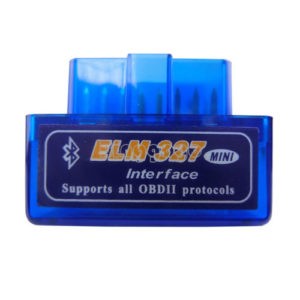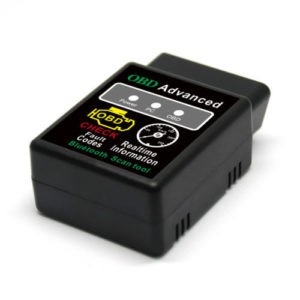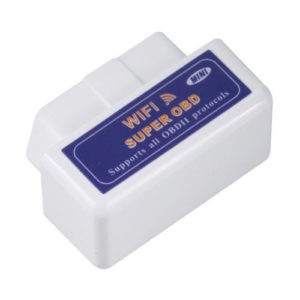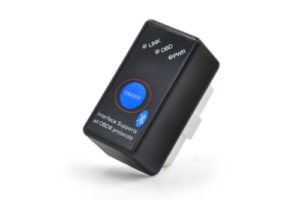Understanding your car’s health is becoming increasingly accessible thanks to OBD2 technology and ELM327 adapters. These small devices bridge the gap between your vehicle’s computer and your smartphone or tablet, allowing you to diagnose issues, monitor performance, and much more. But with a market flooded with options, selecting the right ELM327 OBD2 adapter can be confusing. This guide will help you navigate the choices and pick an adapter that’s not only compatible with your devices but also reliable for accurate car diagnostics.
 bad elm1 1 300×300
bad elm1 1 300×300
Understanding ELM327 OBD2 Adapters
At its core, an ELM327 adapter facilitates communication between your car’s On-Board Diagnostics II (OBD2) system and diagnostic software, often running on your phone or tablet. Think of it as a translator, converting your car’s language into data your devices can understand. The effectiveness of this communication hinges on the quality of your ELM327 adapter. A reliable adapter ensures a stable connection and accurate data transfer, which are crucial for effective car diagnostics. Choosing wisely is paramount to avoid connection issues and ensure you’re getting trustworthy information about your vehicle’s condition.
Connection Types: Bluetooth, Wi-Fi, and More
ELM327 adapters connect to your devices wirelessly, and the connection type is a primary factor in choosing the right one, especially considering your smartphone or tablet’s operating system. Here’s a breakdown of the common connection types:
- Wi-Fi: These adapters create their own Wi-Fi network for your device to connect to.
- Bluetooth Classic (Versions 1.x, 2.x, 3.x): This is the traditional Bluetooth technology, widely compatible with Android devices.
- Bluetooth Low Energy (LE) (Version 4.0 and above): Designed for low power consumption, Bluetooth LE is essential for iOS devices due to Apple’s restrictions on classic Bluetooth for OBD2 adapters.
- Bluetooth MFi: This is a certified version of classic Bluetooth for Apple devices. Adapters with Bluetooth MFi have undergone Apple’s certification process for guaranteed compatibility. These are typically more premium options.
- USB: While USB adapters exist, it’s important to note that they are not compatible with Car Scanner or many modern OBD2 applications that are designed for wireless connectivity.
 bad elm2 300×300
bad elm2 300×300
iOS (iPhone/iPad) Compatibility: Bluetooth LE or Wi-Fi is Key
Apple’s iOS ecosystem, used by iPhones and iPads, has specific connectivity requirements. Classic Bluetooth adapters (versions 1.x, 2.x, 3.x) are not compatible with iOS devices for OBD2 communication. This is a fundamental limitation of the iOS operating system. Therefore, for iPhones and iPads, your viable options are:
- Bluetooth LE (4.0 and newer): This is often the recommended choice for iOS users. Bluetooth LE adapters offer a good balance of ease of connection, reasonable data transfer speeds, and availability.
- Wi-Fi: Wi-Fi adapters will work with iOS, but they can sometimes lead to connection complexities and may interfere with your mobile internet connection as your device connects to the adapter’s Wi-Fi network instead of your usual Wi-Fi router for internet access.
- Bluetooth MFi: For users seeking top-tier performance and guaranteed iOS compatibility, Bluetooth MFi adapters like OBDLink MX+ and vLinker FS are excellent, though pricier, choices.
Crucially, always verify the Bluetooth version when buying for iOS. Many users mistakenly purchase classic Bluetooth adapters, only to find they are incompatible with their iPhones or iPads. This incompatibility is not app-specific; it’s an iOS system-level restriction.
 bad elm3 300×300
bad elm3 300×300
Android Compatibility: Bluetooth Classic is Often Preferred
Android devices offer more flexibility in terms of connectivity. They are compatible with:
- Bluetooth Classic (versions 1.x, 2.x, 3.x): Generally favored for Android due to faster speeds compared to Bluetooth LE and more reliable connections than Wi-Fi. A vast majority of Android users successfully use classic Bluetooth adapters.
- Bluetooth LE (4.0 and above): Android also supports Bluetooth LE adapters.
- Wi-Fi: Wi-Fi adapters are also compatible with Android.
While Android supports all these types, classic Bluetooth adapters are frequently recommended for Android users for their speed and reliability. However, a potential drawback to consider is that some Android devices may experience issues when simultaneously connected to multiple Bluetooth devices, such as an OBD2 adapter and a car’s Bluetooth multimedia system.
 bad elm4 300×300
bad elm4 300×300
Quality Matters: Good vs. Bad ELM327 Adapters
Forget outdated notions about ELM327 adapter versions, specific chips, or circuit board layers. These factors are no longer reliable indicators of adapter quality. The market is rife with counterfeit claims and advancements in manufacturing, making these old metrics irrelevant. Instead, focus on the fundamental distinction: “good” versus “bad” ELM327 adapters.
A “good” ELM327 adapter simply works as intended. It establishes a stable connection, accurately transmits and receives data, and performs reliably without glitches or freezes. Your primary goal should be to find such a dependable adapter.
“Bad” ELM327 adapters, on the other hand, are plagued with problems that can range from minor annoyances to serious issues that could even impact your car’s performance.
 bad elm5 300×200
bad elm5 300×200
Problems with Low-Quality ELM327 Adapters
Using a subpar ELM327 adapter can lead to a multitude of issues:
- Complete Failure: The adapter might simply not work at all, failing to connect or communicate with your car’s ECU.
- Unstable Operation: Inconsistent performance is a hallmark of bad adapters. They might freeze, spontaneously reboot, or stop working intermittently, possibly triggered by temperature fluctuations, humidity, or for no apparent reason. Connectivity and data parameter availability can be erratic from one day to the next.
- Incomplete Command Support: Some inferior adapters falsely claim to support the full range of ELM327 commands but only implement a subset, limiting their diagnostic capabilities.
- Fixed ECU Address: Certain faulty adapters are hard-coded to communicate with only a specific ECU address, preventing access to other control units in your vehicle.
- Data Length Limitations: Bad adapters may impose restrictions on the length of data requests and responses, hindering comprehensive data retrieval.
- Data Loss: Packet loss during data transmission and reception can corrupt data sets, making them impossible to interpret and leading to inaccurate diagnostics.
- Data Corruption: Even worse, a faulty adapter could distort data, potentially sending incorrect commands to your car’s ECU. Imagine accidentally sending an erase command instead of a temperature request – the consequences could be severe.
- Protocol Incompatibility: Poor-quality adapters might only support a limited number of OBD2 communication protocols. If your car uses an unsupported protocol, the adapter won’t work for you, even if it functions correctly on other vehicles.
- On-Board Network Interference: Critically, bad adapters can disrupt your car’s on-board network by sending junk data or excessive requests. This interference can hinder the ECU’s primary function of engine control, potentially causing engine roughness or other performance issues.
- Risks in Advanced Functions: If you intend to use your adapter for advanced functions like ECU coding or service procedures, a high-quality adapter is absolutely essential. Data writing to the ECU is a sensitive operation, and a bad adapter can lead to data corruption and potentially serious damage to your car’s computer systems.
The prevalence of bad adapters in the market is a major concern. The unfortunate reality is that you might encounter multiple faulty adapters before finding a reliable one.
Recommended ELM327 OBD2 Adapters
To help you avoid the pitfalls of low-quality adapters, here are some recommended ELM327 OBD2 adapters based on user reviews and expert experience. Note that pricing and availability can vary.
Top-Tier Recommendations (Higher Price Range):
- OBDLink MX+ with Bluetooth MFi (#ad link): A premium, high-performance adapter compatible with both iOS and Android, featuring Bluetooth MFi for optimized Apple device connectivity. Known for its speed and reliability.
- OBDLink CX with Bluetooth LE (#ad link): Another excellent OBDLink option with Bluetooth LE, offering a large memory buffer and fast performance. Suitable for both iOS and Android.
Mid-Range Recommendations (Good Balance of Price and Performance):
- vLinker MC+ with Bluetooth LE (#ad link): A solid Bluetooth LE adapter from vLinker, compatible with both iOS and Android. vLinker adapters have improved significantly over time and are now highly recommended.
- vLinker FS with Bluetooth MFi (#ad link): The Bluetooth MFi version of vLinker, ensuring seamless compatibility with Apple devices.
- vLinker MS with Bluetooth MFi: Another vLinker MFi option, positioned as a competitor to OBDLink adapters. While initial versions had issues, firmware updates have made them very reliable.
Budget-Friendly Recommendation (Value Option):
- Vgate iCar Pro 2S: A newer and improved version replacing the iCar Pro BLE. A good value choice.
- Vgate iCar Pro BLE (#ad link): This adapter offers dual Bluetooth 2.0 + Bluetooth 4.0, ensuring compatibility across iOS, Android, and Windows. Note: Firmware updates are crucial for older versions (before v.4.1.02 from 2021/01/08) to properly support CAN Extended addressing, especially for Toyota and BMW vehicles. Firmware updates can be downloaded from the manufacturer’s website.
ELM327 Adapters to Avoid
Steer clear of these types and brands of ELM327 adapters, as they are frequently associated with quality issues and compatibility problems:
- xTool Adapters: These are proprietary and not ELM327 compatible, working only with xTool software.
- Wired Adapters (USB, COM): Car Scanner and many modern apps are designed for wireless adapters only.
- “Mini” Adapters: Adapters with “mini” in their name have a very high chance of being low quality.
- Extremely Cheap Adapters: Significantly low prices are often a red flag for poor quality.
- Adapters with MAC Addresses Starting with 11:22:33 and 00:00:00: These are often indicators of generic, unreliable clones.
- KONNWEI Devices: While previously recommended, KONNWEI’s quality has declined, with devices frequently exhibiting data packet loss.
- “Micro Mechanic” Adapters: Many users report these adapters failing after limited use.
- “THINMI.COM” Adapters: Known for limited ELM327 command support and frequent fake responses.
- KUULAA Brand Adapters: Avoid this brand due to reported quality concerns.
- Adapters with a Specific Design: The compact, often blue or black, plastic adapters pictured below are frequently of low quality, despite being widely available.
By understanding the types of ELM327 OBD2 adapters, their compatibility, and the critical differences between reliable and unreliable options, you can make an informed decision and choose an adapter that will effectively and safely unlock your car’s diagnostic potential.
P.S. Please note that links to Amazon.com are affiliate links, and as an Amazon Associate, I may earn from qualifying purchases.